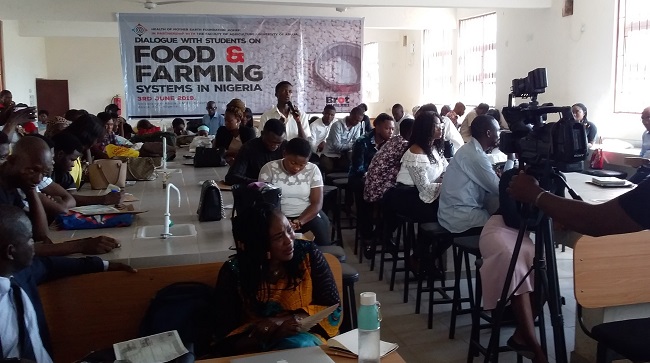Students of agriculture have again called for a ban on products of genetically modified organisms (GMOs) in Nigeria. This call was made at the recent Dialogue organised by Health of Mother Earth Foundation (HOMEF) with the Faculty of Agriculture, University of Abuja, on Monday, June 3, 2019.

In attendance at the Dialogue were the Dean, Assistant Dean, Heads of Departments and students of the faculty. The Dialogue focused on the implications of GMOs on health, environment and on food sovereignty.
The Dean, Professor E.A. Aiyedun, in his welcome remarks, stated that GMOs present threats to the environment, and to human health. He explained that, in the process of gene transfer, new diseases, pests or weeds may emerge. He also said that ecological niches would be disrupted with GMOs and that although environmental risk assessments can be used to manage risk, the parameters to quantify the affected areas are unavailable.
In concluding his address, the dean stressed that the social, economic and ethical issues around GMOs should be carefully considered. He also highlighted the need for increased public awareness and participation in decision making concerning GMOs.
Mr Musa Wazani, a medical laboratory scientist, explained that GMOs are plants, animals or microorganisms whose genetic materials (DNA) have been deliberately altered with the intent to attain desired quality, affect yield or confer the ability to resist pests or herbicides.
He noted that while genetic engineering has been useful in the pharmaceutical industry, in production of insulin for instance, the manipulation of genetic material of food crops raises serious concerns for both present and future generations.
Speaking on the impact of GMOs on human health, he stated that the allergenic potential of the microbial proteins introduced into the plants or animals is uncertain, unpredictable, and largely untested; adding that several immune disorders, cancers, birth defects, liver and kidney diseases have been linked to the consumption and use of GMOs-associated products.
On environmental impacts, he noted that GMOs and their attendant herbicides may be toxic to non-target organisms: birds, butterflies, bees and beneficial soil organisms.
“This”, he added, “will have huge impact on biological diversity and disrupt ecological balance.”
Also speaking at the Dialogue, Mariann Bassey-Orovwuje, a lawyer and food sovereignty activist, noted that cultivation of GMOs affect livelihoods of small-scale farmers as they favour industrial agriculture which is characterised by high chemical inputs, expensive seeds and monoculture systems. She also noted that Nigeria would lose market for agricultural products if we embrace GMOs because these products are widely rejected by consumers.
Bassey-Orovwuje added that coexistence is not possible with GMOs and that they pose serious threats to indigenous varieties and local knowledge. She called for a precautionary approach to the technology and for stricter biosafety regulation in Nigeria.
Some of the students wondered if there can be a middle ground between GMOs and conventional crops. It was explained that such is not possible as GMOs will contaminate natural varieties through pollination and although labelling can help people, to an extent, make informed decision, this action is resisted by the biotechnology corporations and is incompatible with our food production and distribution systems.
A viable alternative to GMOs which was discussed during the Dialogue is Agroecology. It was explained that Agroecology is an innovative and holistic approach which promotes local knowledge and systems, ensures increased productivity, supports local farmers, nourishes ecosystems and provides resilience to impacts of climate change.
Joyce Ebebeinwe, HOMEF’s Project Officer, presented the report of a market shelves survey on GMOs carried out in 2018 in 10 major cities in Nigeria. According to the report, over 30 different products of GMOs were found in the Nigerian markets including popular cereals such as cornflakes, cocoa puffs, cheerios; vegetable oils; ice cream; noodles; food spices; and mayonnaise.
Ebebeinwe encouraged personal commitment to research on the implications of GMOs and called for collective action towards a ban of the products in Nigeria.
It was noted among the students that since the safety of GMOs is not certain, Nigeria should focus on and invest in research for alternative ways of increasing food productivity and tackling the incidence of pests and diseases.
Ikeh Dorcas Olemeh, a 400 Level student of Agricultural Economics and Extension, stated that more support should be given to small scale farmers in terms of extension services, storage facilities, good roads to access markets and that information including recent research findings should be made available to them.
At the conclusion of the Dialogue, it was agreed that, in addition to research on alternatives to GMOs, studies in institutions across the country and particularly in agricultural institutions/faculties should be made more practical than theoretical to equip students with the needed skills to respond to agricultural challenges. It was also agreed that the government should enforce stricter regulations to check the importation and proliferation of GMO products in Nigeria.
The students and members of staff at the Dialogue pledged to engage in further study and spread word about GMOs in their communities.
